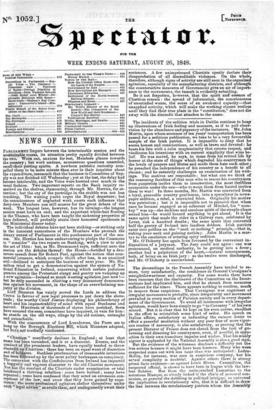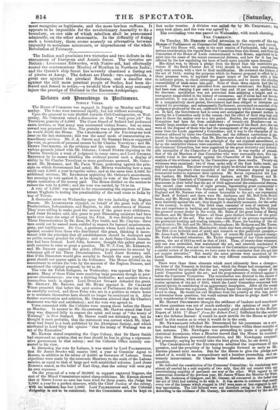The froceedings in the French Assembly have tended to re-
store, very satisfactorily, the confidence in General Cavaignac's straightforwardness and capacity. For some weeks there have been rumours that the disclosures of the Committee on the Insur- rections had implicated him, and that he shrank from measures sufficient for the times. There appears nothing to confirm, much to remove those suspicions. That Cavaignac was cognizant of irregular movements is probable, since irregularity and movement prevailed in every section of Parisian society and in every depart- ment of the Government. To avoid all intercourse with irregular agitators, would have been simply to go "to Coventry" of his:own accord. But it is clear that he kept on his even course, steadfast in the effort to reestablish some kind of order. His speech on Italian affairs, satisfactory as indicating the earnest desire to effect a peaceful mediation without any poor fear of more vigor- ous courses if necessary, is also satisfactory, as proving that the present Dictator of France does not shrink from the task of go- verning and directing his countrymen, even, if needful, in oppo- sition to their own transitory impulse and wishes. That his manly vigour is applauded by the National Assembly is also a good sign. But the evidence of the witnesses discloses a difficulty not the less serious because it might have been foreseen. Many who were suspected come out with less taint than was anticipated : Ledru- Rollin, for instance, was seen in suspicious company, but his actual complicity is doubtful. Against others there is strong prima facie evidence—as against Louis Blanc. Caussidiere, the suspected official, is shown to have been in league with the law- less Sobrier. But from the unim peached Lamartine to the notorious Blanqui, so closely linked is the chain of personal con- nexion, so general the dabbling in political intrigue, so universal the implication in revolutionary acts, that it is difficult to draw the line between the revolutionary patriots whom the Assembly
must recognize as legitimate, and the mere lawless ruffians. It appears to be impossible for the revolutionary Assembly to fix a boundary, on one side of which rebellion shall be pronounced admirable, on the other abominable. In the difficulty of fixing such a boundary, there seems scarcely an alternative between impunity to notorious miscreants, or impeachment of the whole Revolution of February.



























 Previous page
Previous page